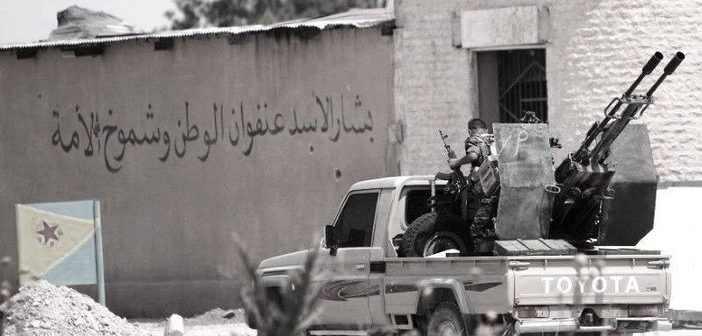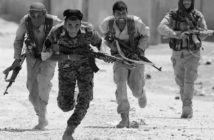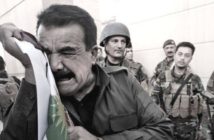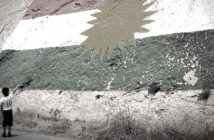Rarely taken into account in the analyses made about the future of the Syrian Kurdistan (Rojava), an opposition exists to the dominant Kurdish current represented by the PYD-YPG (Syrian political and arm of the PKK).
The Maghreb and Orient Courier met Ibrahim Biro in a hotel in Erbil.
He is the head of the Kurdish National Council in Syria (KNCS), exiled in the Iraqi Kurdistan.
The two first parts of this interview was published in The Maghreb and Orient’s issues of May and June 2017.
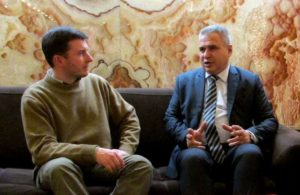 PPdP – The government in Rojava was elected, wasn’t it?
PPdP – The government in Rojava was elected, wasn’t it?
Ibrahim Biro – This is not true. I’m not aware of any elections. This is exactly the same as the elections of Bashar al-Assad. After the elections, 99% of the people voted for the party.
PPdP – Do you think that the Rojava government is not legal and not democratic?
Ibrahim Biro – No. You can’t speak of democracy in general. But there are two types of democracies: Stalinism and liberalism. In short, the PYD is with the former.
The last time I tried to go back to Rojava, they kicked me out. Before that, they expelled me and said that if I come back, they’d cut me to pieces.
Through the President’s chief of staff, a request was conveyed to the PYD asking access to come back home. The President’s office said that they wanted assurances that I will be safe, because right now my life is in danger. I asked them who is threatening me: in my home city, the regime is not present, and neither is Daesh. So, who is going to threaten my life? There was no reply.
If I could get permission to cross, I’d go home tomorrow. They want one thing: they want the leadership of the Kurdish National Council to be abroad, not at home. To be outside of Rojava. We know that if we’re in exile, and working from outside, then our role within the community will stay weak. That’s why we are forced to try to cross again and even be killed for it. In December 2016, all the offices of the Kurdish National Council were burnt and shut down. They also burned all the flags of Kurdistan.
Recently, there were three individuals who were burnt to death alive. On that day, PYD went to their village, and they took many people for conscription, including these three people who are above the age for military service. They took them, then we don’t know what happened to them. They were killed. PYD told the family that these men were all members of a political party in Syria called the KDP of Syria. When they were burnt, a candle burned the tent they were in. So, the flaming tent killed them. PYD didn’t hand over the remains to the families to burry. They kept them. We believe that the PYD killed all three of them, and then burned their bodies.
In Tal-Tamar, in Amuda and in Serikani, the PYD burned all three of my offices after I was expelled from Rojava.
The Rojava Peshmerga who are fighting with us in Iraqi Kurdistan are martyred when they die. We send their bodies back to Rojava to their hometown. PYD does not allow their bodies to go back. Some months ago, Mohammad Ismaili, deputy secretary general of the political bureau of the KDP in Syria, was waiting for the remains of a Syrian Kurdish Peshmerga who was killed in Iraqi Kurdistan. Because he was waiting to receive it, as a senior politician, PYD arrested him. Until now, he’s in a PYD prison.
They also arrested 36 other individuals, who were waiting for the martyrs. For example, Abdullah Gado, who is a member of the central committee of the Union Party of Kurdistan.
PPdP – Did you complain to the Rojava government?
Ibrahim Biro – No. We will never deal with this government because we do not recognize it.
PPdP – I interviewed Akram Hesso, the previous Prime Minister of Rojava, one year ago. I also spoke with the foreign minister Dr. Abdullah. These two men were very peaceful men. I trust them.
Ibrahim Biro – I can say this to you. Both the former Prime Minister and Foreign Minister, are my personal friends. I know them. I know them very well. Behind every one of these officials is a member of the PKK. Neither of them are decision-makers. The PKK cadre is the decision-maker.
When they signed… The relations between the KDP and the PYD, and the Kurdish National Council and the PYD, were not always this bad. You know, in 2011 when it was formed, in 2012, 2013 there were a number of agreements. The latest one was in Dohuk. The PYD was a member of it. They agreed to share power and to work together. As soon as they went back to Rojava they began expelling all the politicians, non-YPG politicians, all other factions. They closed down offices, they prevented protests. They don’t allow Rojava Peshmerga bodies, nor the remains, to go back home. The Kurdish flag is not allowed in Rojava. We cannot accept them doing this. We can’t do this.
To go back to the point where you spoke of the PYD accusations… They accuse us, the Kurdish National Council, of being puppets and they accuse President Barzani of looking out for his own interest… When the war against ISIS started, President Barzani was one of the first to go to the front-lines. His own family members are at the front-line, more than anyone else. I’ve been with his sons.
PPdP– Yes, but I made a reportage about one thing especially. Petrol. It was amazing. I saw coming from Mosul, tankers and tankers, crossing the border. The Peshmerga of the KDP said “let’s go, let’s go”… I followed the trucks and it was just a small trip inside Kurdistan, because immediately they went inside Turkey by the Tree-Point Passage. Afterwards I followed the trucks coming empty back from Turkey going to Daesh territories.
I was shocked, because Peshmerga from all parties are dying at the front-lines. Even Peshmerga from the KDP. Then the Americans target this…
Ibrahim Biro – I know exactly what happened. In 2014 oil-trucks came from Daesh territory, through Kurdish territory to Turkey. There were businessmen buying the oil. I know who they are as well. In 2014, it became a headline. It made news. I think it was the Financial Times who announced it. And immediately the KRG [the Kurdish Regional Government, in Iraq – Erbil] stopped it within days.
PPdP – Because it was public.
Ibrahim Biro – Because it was a shame this happened whilst people were dying.
PPdP – But they knew it before of course… There were trucks and trucks passing roads controlled by the Peshmerga.
Ibrahim Biro – Nobody will deny it. When the KRG comes down and says it happened and they’ve stopped it, I can’t deny it. It happened, and it happened for months, and then the KRG ended it. My understanding is that it was before they attacked us. The Peshmergas didn’t start the war on ISIS. Oil tankers were coming in….
PPdP – No. It was after the attack on Erbil. My first trip in Kurdistan was just after Daesh tried to invade Erbil and the Coalition targeted them. I saw the tankers afterwards. I wrote an article explaining that Turkey needs oil and because Barzani is very closely allied to them, he organised the traffic.
Ibrahim Biro – I don’t think that it is a presidential thing. I think it’s a deal between local businessmen and they send it across the border.
PPdP – Yes, but in Kurdistan everyone knows everybody, and everything is linked.
Ibrahim Biro – Yes of course! But I think it’s wrong to say that the President approved it or knew about it.
PPdP–The Peshmerga were ordered to let them go…
Ibrahim Biro – My understanding was that it was coming from ISIS territory for 46 dollars per barrel, which was very cheap because oil-prices were very high then. My understanding is that it was coming through Kirkuk to Kurdistan and out into Turkey. That’s my understanding. I didn’t know it was coming through Erbil. The oil was originated from Mosul.
PPdP – One word about the Iraqi Kurdistan goal, to be independent…
Ibrahim Biro – We want complete independence, for all the Kurds. The President Barzani has announced it, many times now, for Iraqi Kurdistan.
PPdP – But America does not want that. Right?
Ibrahim Biro – I don’t think America will get in the way. I don’t. The President has said, that for independence we must work with Baghdad.
PPdP – What about the referendum?
Ibrahim Biro – The President Barzani has his policy, which I think is great. He said it’s better to negotiate with Baghdad to separate. He said that we have to work with Baghdad to achieve a peaceful separation. And until now there were two negotiation committees speaking to each other about a peaceful separation. If Erbil and Baghdad would have agreed to peacefully separate, there would have had no need for a referendum. Because we don’t reach an agreement, we go to a referendum, and let the people decide. Many countries have done this, it’s simple.
My point is, look at what Baghdad has done to the Kurds. They’ve cut off the KRG’s budget. At the beginning, they didn’t help in the war against ISIS, with refugees, with the burden… But the KRG has to work with Baghdad for independence. He has to work with Turkey regarding the oil exports. He has to talk to Iran regarding future oil and gas pipelines with Iran. Kurdish are landlocked, you can’t shut all our neighbours out and say that we’ll do whatever we want out here.You have to work with your neighbours.
And PYD has already two of its neighbours. You said to me that it’s obvious that President Erdogan has signed a deal with Bashar al-Assad regarding Aleppo, Jarabulus and Free Syrian Army. This is a disaster, because PYD only has two ways out right now. Turkey and Iraqi Kurdistan, right? Both borders are shut because the KRG disagree with what the PYD is doing to the Kurdish National Council, to certain political parties, to our members, to the Kurds, the conscription, the return of Rojava Peshmerga fighters…
PKK and Turkey have their own thing, that’s why Turkey has shut the border. The only way out for Rojava is to the south, through Bashar al-Assad. And you say that obviously, there is a deal between Bashar al-Assad and Erdogan. If this is true, then my goodness! They’re in a lot of trouble! Because then Bashar al-Assad will not work with them either. Is this a victory? You’ve shut out everyone, and everybody closes in on you. Is this winning? You have to work with people.
PPdP – Your policy is very pragmatic.
Ibrahim Biro – Our policies are very pragmatic.
Even concerning the PYD and the PKK… The KRG helped them as well in Kobane, sending fighters and tanks when they needed them. The KRG was not against the PYD. If they have their own ideology, so be it. Whatever it is. They were part of the Dohuk agreement. They were part of the Erbil agreement.
But, now, they’re not only shutting neighbours out. They are shutting all the other parties out as well. So far, it’s a disaster, because now the Kurdish project is paying the price. Turkey is coming into Jarabulus. Between Al-Bab they’ve come in. Kobane and Afrin can never connect anymore, it’s finished. They will never connect. And if they have done a deal, between Turkey and Syria, then the Kurdish project will never be realised, it’s finished. So, who wins? I can tell you who wins: it’s not us.
So, in Syria, the people of Rojava are paying the price. It’s not Erbil and it’s not Ankara. It’s not Damascus that pays the price. Because Damascus is empowered because of what happened in Aleppo. Erbil continues to do its deals with Turkey based on mutual interests. Who pays the price? The Kurdish people in Rojava. I don’t see how this is winning. I don’t see what the PYD gains. I think the policies of the PYD have been a disaster.
But…
You asked us many questions, now I have a question for you. Two questions. First of all, do you believe as an individual that the PYD is separate from PKK? And second, do you think that there is no deal between the PYD and the Syrian regime?
PPdP – First question: no of course, they are completely linked. That’s clear, I think. Secondly, it’s an awful question, because I have so much sympathy for the YPG fighters… I was sometime in the front-line with them against Daesh. But I think yes, there is a non-verbal agreement.
Ibrahim Biro – We believe the regime has handed over the Kurdish security file to the PYD. The regime allows the PYD to do what it’s doing to us. It’s more than half a century of what the Baathist have done to us.
For 50-60 years, the regime tried to destroy the Kurdish project in Syrian Kurdistan and it couldn’t. And now through PYD it has completely changed the demographics of Rojava (of Syrian Kurdistan). All of PYD’s policies only apply to the Kurds in Rojava, they don’t apply to other communities. Conscription doesn’t apply to Arabs.
On the contrary, they defend the Arabs who were brought in by the regime. You know, the forced displacement… In Aleppo, some of our (PYD) territory was taken away from us and given to Arabs, and today the PYD is defending that area. This is the democracy of the PYD! If you go to North-Korea, how many of the locals defend their leaders… It’s the same.
On Manbij… They lost 700 fighters. If you want to connect to Afrin we don’t know why you go to Manbij. If you want to connect to Afrin, you go through Jarabulus. And they went to Manbij. Why? There are no Kurds in Manbij!
It doesn’t make sense! Nobody understands… I mean: we know why they went to Manbij, but it doesn’t make sense. They went to Manbij because there was a corridor for ISIS fighters, but it’s not Kurdish territory. There is no Kurdish community living there. Only 1-2% of the people living there are Kurds.
They wanted to go there because the Coalition wanted to cut the route from Manbij for ISIS fighters. It doesn’t make sense. Just because we knew ISIS was in Mosul, do the Kurds go to Mosul? It doesn’t make sense, we din’t go to Mosul. It’s not in the Kurdish interest, to send Iraqi Peshmerga to Mosul. It didn’t make sense for YPG to lose so many fighters for Manbij.
I told you: with PKK and PYD, with YPG, there will not be any Kurdish project in Syria.

